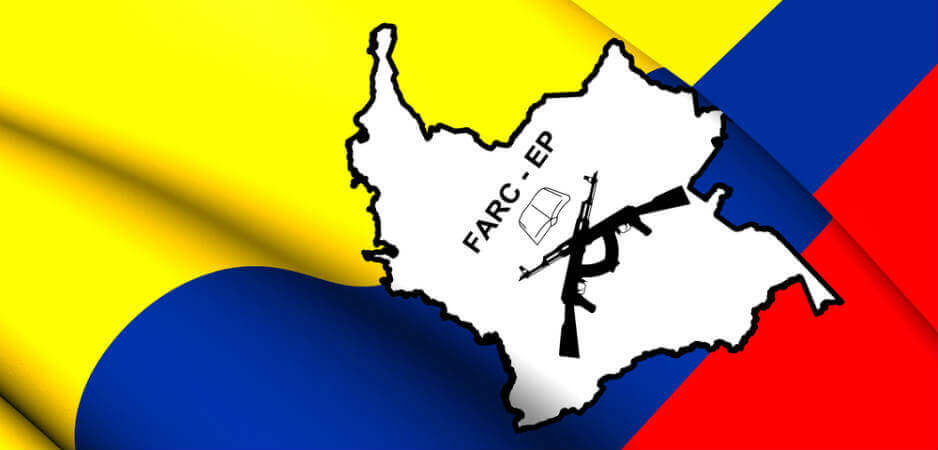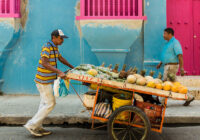Polls suggest that the FARC party will receive less than 1% of the popular vote in Colombia’s upcoming elections.
After finally seeing the end of the longest internal armed conflict in the Western hemisphere, Colombia is set to elect a new congress on March 11 and a new president on May 27. The 2018 elections cycle will be a response to the peace agreement with the Revolutionary Armed Forces of Colombia (FARC), signed in 2016, and its aftermath. Pro-peace politicians and skeptics are currently neck and neck in the opinion polls. Important criteria for voters include individual candidates address current public concerns such as corruption, unemployment and security, as well as a strategy for negotiations with Colombia’s second largest insurgent group — the National Liberation Army (ELN).
The upcoming elections will mark the first time in Colombian history that former FARC combatants will hold seats in both chambers of congress and participate in presidential elections. Even though the peace accord automatically grants them five seats in both houses for two terms (until 2026), it remains to be seen whether they succeed or succumb to the same fate as Pablo Escobar’s foray into politics.
Peace Skeptics
Although most outsiders applauded President Juan Manuel Santos for signing the peace deal with the FARC (which won him the Nobel Peace Prize in 2016), his legacy in Colombia remains controversial. The main criticism has been leveled against a decision to grant immunity to the former guerrillas and allowing them to participate in political life — moves that were rejected by ordinary Colombians in a nationwide referendum. Wary of further objections, the Santos administration sought congressional approval rather than turning to the public to vote on amendments to the deal. It is hardly surprising that a recent survey by the pollster Invamer found that almost 70% of Colombians think that the peace agreement has been poorly implemented.
It would also be unwise to criticize Colombians for having such a dim view of the peace process. According to Human Right Watch’ World Report 2018, about 7.7 million Colombians have been internally displaced by conflict-related violence since 1985. Additionally, the FARC performed more than 23,000 selective assassinations between 1981 and 2012 and 27,000 kidnappings between 1970 and 2010. According to the National Center for Historical Memory 2013 report, the group is also responsible for an additional 11,000 deaths or injuries resulting in amputations.
Finally, it’s by no means lost on the Colombian public that while the FARC has transitioned from guerrilla army to political party, it still uses the same acronym. The cosmetic name change from the Revolutionary Armed Forces of Colombia to People’s Alternative Revolutionary Force is supposed to reflect the group’s determination to actively participate in political life. “We have entered legal politics because we want to govern,” said Iván Márquez, a member of FARC’s secretariat. Since then, the group has launched its political campaign and endorsed Rodrigo Londoño’s (or Timochenko, as the group’s former leader is known) presidential bid.
Both moves can be compared to Pablo Escobar’s aspirations for political power. Despite earning billions of dollars from exporting cocaine — a trade that ensured his place on Forbes’ richest list for seven consecutive years — the former head of the notorious Medellin Cartel dreamt of becoming Colombia’s president. With his increasing wealth, Escobar successfully ran for public office and even became a member of the lower house of congress. However, his political career was a short-lived strategic error. Being in the public spotlight meant Escobar had no choice but to confront his violent background, which eventually led to the revoking of his congressional seat. Thanks to their amnesty, FARC’s leaders have no such worries regarding their political careers.
Blank Ballots
Despite the fact that the peace agreement cannot be reversed until at least 2030 (in October 2017, Colombia’s constitutional court determined that the next three governments must follow the accord commitments), the election campaign will be almost all about it. A recent opinion poll indicates that the Partido Liberal (18%), which supports the peace deal, is garnering the same level of support as the Centro Democrático (CD, 16%), which rejects the accord. Additionally, similar to other parts of the world, independent candidates in Colombia with no apparent affiliations to traditional political parties are proving very popular (21%). Their popularity is strengthened by the findings of the latest Latinobarómetro poll, which suggests that only 10% of Colombians trust established political movements. What is more, 20% of Colombians said they will cast a blank ballot in the presidential elections.
While the above opinion polls suggest that it is hard to predict who will win the next parliamentary elections, it nevertheless seems that CD, represented mainly through the ex-president Alvaro Uribe, is the most organized. The No campaign, which opposes the peace deal, is also particularly adept at mobilizing crowds and convincing people to turn out in high numbers on election day. It’s an altogether different story than President Santos’ Partido Social de Unidad Nacional (U Party), which is currently languishing at 8% in the polls.
The leftist Polo Democrático Alternativo is tipped to benefit the most from the U Party’s declining popularity, especially if it can convince undecided voters to support them. Polo Democrático Alternativo’s hand is further strengthened by the support it receives from indigenous tribes, Afro-Colombians, farmers and other social groups that have largely been ignored by the current government. The last big player is former President’s Vargas Lleras’ center-right, pro-peace Cambio Radical party, which has steadily gained popularity since its establishment in 2006. Invamer predicts that the FARC party will receive only 0.5% of the popular vote.
The race for the presidency is more open. Thanks to a constitution that forbids a third consecutive term, we already know that neither incumbent President Santos nor Uribe can run. In keeping with the parliamentary elections, many candidates have started to explore ways to broaden their appeal through political coalitions and running as independents. Recent opinion polls also suggest that focusing solely on the peace accord will not be popular. The successful candidate must address other concerns such as corruption (20%), the economy and unemployment (20%), combating terrorism (10%) and improving security (10%). Additionally, he or she must provide a concrete proposal for how the government should handle the implementation of the peace accord and possible negotiations with the ELN.
President Santos’ center-right coalition won the last two elections with promises of more equitable growth and the end of internal conflict. However, his critics say that instead of focusing on governance, he spent too much time, energy and political capital on accommodating a criminal group. As a consequence, his approval ratings fell to 24%, a significant decline compared to 75% in 2011. It’s highly unlikely that his U Party will not endorse any candidate for the upcoming race.
Gustavo Petro, the leftist former mayor of Bogota and former member of the now-defunct M-19 rebel movement, currently leads the opinion polls with 22% support. He portrays himself as an anti-establishment candidate and successfully attracts young people and those who do not trust traditional parties. Other candidates include Sergio Fajardo, the liberal former mayor of Medellin. His center-left electoral Coalición Colombia (which includes Partido Verde and Polo) supports the peace process and has built its campaign around anti-corruption and clientelism that plagues the Colombian public sector. Finally, there’s Centro Democrático’s Ivan Duque, a critic of the peace deal who is targeting the same groups that helped win the No vote in the referendum.
Flirting with Politics
The FARC’s flirtation with politics may become a curse rather than a blessing. Pablo Escobar’s example shows that being in the spotlight does not necessarily wipe the slate clean. However, his case also demonstrates that hunger for political power can be unstoppable. There is no doubt that the FARC has already achieved much more than Escobar. It can legally participate in political life and has been granted amnesty and seats in both chambers of parliament for two terms. However, Escobar’s dramatic fall from political grace should serve as a warning.
Last month’s attacks on Timochenko’s convoy further demonstrate the FARC’s lack of popular support. This is particularly the case for its leader, Rodrigo Londoño, who recently polled the lowest level of support among the presidential candidates (1.6%). It’s safe to say that Timochenko will not be the next president of Colombia. After two terms in Congress, the FARC should also assess its achievements in politics. It might be more practical to move into business rather than meddle in the political sphere.
The views expressed in this article are the author’s own and do not necessarily reflect Fair Observer’s editorial policy.
Photo Credit: yui / Shutterstock.com
Support Fair Observer
We rely on your support for our independence, diversity and quality.
For more than 10 years, Fair Observer has been free, fair and independent. No billionaire owns us, no advertisers control us. We are a reader-supported nonprofit. Unlike many other publications, we keep our content free for readers regardless of where they live or whether they can afford to pay. We have no paywalls and no ads.
In the post-truth era of fake news, echo chambers and filter bubbles, we publish a plurality of perspectives from around the world. Anyone can publish with us, but everyone goes through a rigorous editorial process. So, you get fact-checked, well-reasoned content instead of noise.
We publish 2,500+ voices from 90+ countries. We also conduct education and training programs
on subjects ranging from digital media and journalism to writing and critical thinking. This
doesn’t come cheap. Servers, editors, trainers and web developers cost
money.
Please consider supporting us on a regular basis as a recurring donor or a
sustaining member.
Will you support FO’s journalism?
We rely on your support for our independence, diversity and quality.







